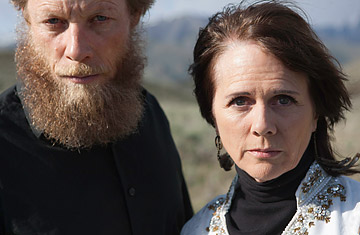
From their home in Idaho, Bob and Jani Bergdahl have been working for three years to secure their son Bowe's release
(3 of 8)
At the beginning, Bowe Bergdahl refused to make life easy for his captors. "He was not cooperating," one Taliban commander tells a TIME special correspondent based in Peshawar, Pakistan. Initially, Bergdahl refused to eat as he was moved rapidly around the border region of Pakistan and Afghanistan. After his capture, he was taken first to the Pakistani town of Angoor Adda, which borders the Afghan province of Paktika, where Bergdahl's Army unit was based. Soon after, he was shifted to the thickly forested mountains of North Waziristan's Shawal Valley, where the network of the Taliban-aligned militant leader Sirajuddin Haqqani is headquartered. North Waziristan is a forbidding, xenophobic land of suspicious clans where no stranger goes unnoticed and where perilous terrain makes infiltration by even the most dedicated intelligence agencies extremely difficult. Another militant who, like the others, requested not to be identified, in deference to Taliban rules against speaking to the media, said that once Bergdahl was in Pakistan he was almost entirely beyond the reach of the U.S. military. "We had been waiting for years and years to hunt down such an important bird. Once one fell into our hands, then we knew how to keep it safe and sound."
How Bergdahl fell into the hands of the Haqqani network remains unclear. Within days of his disappearance on June 30, a Taliban commander crowed to the media that his group had captured a drunken American soldier outside his base. Two and a half weeks later, they released a video. Bergdahl, dressed in local garb and showing the beginnings of a wispy beard, said he had been captured after falling behind on a routine foot patrol. Unnamed soldiers from his base, however, told international media outlets that he had wandered into the scrub-covered mountains on his own with his journal and a supply of water, leaving his weapons and armor behind. An unidentified U.S. official told the Associated Press at the time that he had "just walked off" after his guard shift was over.
Whatever the truth, Bergdahl was in the custody of one of the most violent factions of the Taliban. After his initial rebelliousness, Bergdahl started cooperating a little more, militants say. At times he was looked after by a group of English-speaking fighters, "so he does not feel bored," says the commander. He drank mineral water and boxed juices and was eventually allowed the foods of his choice, within reason. "Under the rules of melmastia, 'Pashtun hospitality,' he will eat the same foods his captors eat," says Jere Van Dyk, a CBS news consultant who was captured and held for 45 days in 2008 by the same group. "There will be dal, rice, and meat when they can afford it." In the right season, they might offer spinach or eggplant cooked in oil. "They will provide him with soap and toothpaste, all the amenities they can to show that they are taking care of him. He will have a cot and a quilt."
Even though Bergdahl is the only American service member the Taliban have successfully captured, kidnapping and hostage taking have long been tactics of the militant group. Since 2001, fighters in Afghanistan and Pakistan have seized hundreds of aid workers, journalists, wealthy Pakistanis and other people the Taliban considers worthy of ransom or negotiation.
